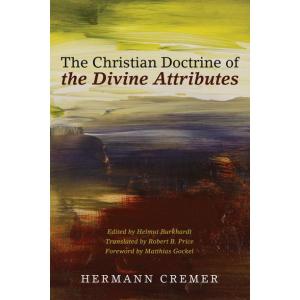The Christian Doctrine of the Divine Attributes by Hermann Cremer, Chapter 3: First Series: Divine Attributes Disclosed in Revelation: 3: The Wisdom of God (pp. 47-54)
This is my contribution to a continuing discussion of Cremer’s book. If you have read these pages, feel free to comment. If not, feel free to ask a question. In about one week I will offer here my thoughts about Cremer’s treatment of the attribute of God’s omnipotence (pp. 55-69).
A reminder: Cremer is here (in 3: First Series) discussing the attributes of God known ONLY through revelation. He believes these three attributes—holiness, righteousness, and wisdom, encompass other attributes that are known only through revelation.
Here he defines God’s “wisdom” as “the exaltation of his will for the salvation of the world over the law of consistency, as he has accomplished it, and will accomplish it in redemption and its completion.” (47) Also, “God’s wisdom displays his opposition to sin not in our destruction, as would be reasonable, but ‘beyond all understanding’ (Phil. 4:7) in our redemption.”
Whoever has read the previous two sections (about God’s holiness and righteousness) can see immediately that God’s wisdom is, according to Cremer, virtually the same as his holiness and righteousness (but not identical).
A few thoughts about Cremer’s treatment of God’s wisdom:
First, according to Cremer, we cannot know God’s wisdom apart from revelation. It is not any wisdom we would guess at on our own. It is not continuous with or even consistent with philosophical ideas of wisdom.
Second, it cuts across the law of consistency. To the mind that has not received revelation by faith, God’s revealed manner of dealing with humanity is irrational. But it is not in itself irrational because God’s love-in-freedom is his own rationality.
Third, according to Cremer, the world exists for God’s redemption of us. “Wisdom finds its particular activity in redemption, within which preservation has its purpose and creation regains its purpose.” (49) This anticipates Barth’s idea that the entire purpose of creation is redemption. The creation is the outer basis of the covenant which is the inner basis of creation.
Fourth, on page 51 Cremer finally reveals what “election” means: God’s “one purpose and goal: to save those who want to be saved.” The elect are those who want to be saved. God’s wisdom is his desire and plan to save them.
Fifth, according to Cremer, in contradiction to Hegel, there is no rational “world system” that can be rationally discerned apart from revelation. It seems that for Cremer, Hegel is one, if not the, foil. Saying of the Christian: “The idea of reason in history is for him at best an inadequate attempt to solve the actual riddle of the world.” (49)
Sixth, and finally, again, for Cremer, God’s redemption of the world is entirely free but flows from his love which is his essence. Cremer would surely brush off any critical questions about this as appealing to a law of consistency that does not apply to God. “God is free in his relation to the world; the world is bound to him.” (54) An inquiring mind, however, might not be satisfied with this “Kierkegaarding defiance” of reason. If love is God’s essence and his wisdom is to create the world in order to redeem it, how could it be otherwise? Is God free to destroy the world and send everyone (all sinners) to hell? Would that be wise? In other words, was Cremer a voluntarist or not? It’s hard to tell.
*Note: If you choose to comment, make sure your comment is relatively brief (no more than 100 words), on topic, addressed to me, civil and respectful (not hostile or argumentative), and devoid of pictures or links.*














